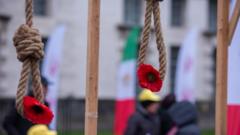In 2024, Iran has seen a steep rise in executions, drawing criticism from international human rights advocates and the United Nations.
Iran Executes 901 in 2024, Marking Highest Rate in Nearly a Decade

Iran Executes 901 in 2024, Marking Highest Rate in Nearly a Decade
UN Reports Alarming Increase in Death Penalty Cases Amid Rising Concerns for Human Rights
According to the UN human rights chief, Volker Türk, at least 901 individuals were executed in Iran in 2024, marking a troubling 6% increase from the previous year. This notable rise represents the highest total in nearly nine years. Türk expressed deep concern over this trend, stating, "It is high time Iran stemmed this ever-swelling tide of executions." He emphasized the urgent need for the Iranian authorities to impose a moratorium on the death penalty, underscoring that its use is often incompatible with the right to life and poses a risk of wrongfully executing innocent individuals.
Most executions in Iran continue to be for drug-related offenses. However, the UN has highlighted that individuals involved in the 2022 protests, which challenged state control, have also faced capital punishment, indicating a potential politicization of the death penalty in the country. In an alarming trend, there has been a rise in the execution of women as well; reports indicate that at least 31 women were executed in 2024, the highest number since monitoring began 17 years ago.
Among these cases, some stand out, including Leila Ghaemi, who was sentenced after a violent incident involving her husband and daughter. Another case involved Parvin Mousavi, who was executed for drug trafficking, an act influenced by economic desperation. Activists argue that drug offenses do not constitute the "most serious crimes" eligible for the death penalty, as defined by international law.
Reports from various reliable organizations, including Iran's Human Rights Activists News Agency and Hengaw, reveal a disproportionate impact on Iran's ethnic minorities, with hundreds of Kurds among the executed. The UN's analysis points to systemic discrimination against these groups, particularly following the nationwide protests that erupted after the death of a young Kurdish woman in custody for violating hijab regulations.
The human rights situation in Iran has garnered global attention, as it accounted for an overwhelming 74% of noted executions worldwide in 2023, according to Amnesty International. However, it is crucial to acknowledge that these statistics do not include China, where the true number of executions remains classified.
As public outcry grows over the human rights situation in Iran, the international community is calling for accountability and reform, urging the Iranian government to adhere to global human rights standards and to end the use of the death penalty.






















